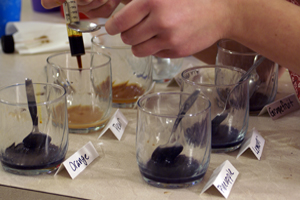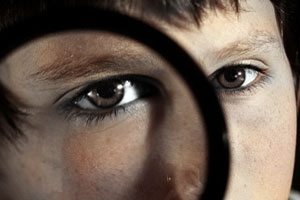

The Scientific Method by Science Made Simple
Understanding and using the scientific method.
The Scientific Method is a process used to design and perform experiments. It's important to minimize experimental errors and bias, and increase confidence in the accuracy of your results.

In the previous sections, we talked about how to pick a good topic and specific question to investigate. Now we will discuss how to carry out your investigation.
Steps of the Scientific Method
- Observation/Research
- Experimentation
Now that you have settled on the question you want to ask, it's time to use the Scientific Method to design an experiment to answer that question.
If your experiment isn't designed well, you may not get the correct answer. You may not even get any definitive answer at all!
The Scientific Method is a logical and rational order of steps by which scientists come to conclusions about the world around them. The Scientific Method helps to organize thoughts and procedures so that scientists can be confident in the answers they find.
OBSERVATION is first step, so that you know how you want to go about your research.
HYPOTHESIS is the answer you think you'll find.
PREDICTION is your specific belief about the scientific idea: If my hypothesis is true, then I predict we will discover this.
EXPERIMENT is the tool that you invent to answer the question, and
CONCLUSION is the answer that the experiment gives.
Don't worry, it isn't that complicated. Let's take a closer look at each one of these steps. Then you can understand the tools scientists use for their science experiments, and use them for your own.
OBSERVATION

This step could also be called "research." It is the first stage in understanding the problem.
After you decide on topic, and narrow it down to a specific question, you will need to research everything that you can find about it. You can collect information from your own experiences, books, the internet, or even smaller "unofficial" experiments.
Let's continue the example of a science fair idea about tomatoes in the garden. You like to garden, and notice that some tomatoes are bigger than others and wonder why.
Because of this personal experience and an interest in the problem, you decide to learn more about what makes plants grow.
For this stage of the Scientific Method, it's important to use as many sources as you can find. The more information you have on your science fair topic, the better the design of your experiment is going to be, and the better your science fair project is going to be overall.
Also try to get information from your teachers or librarians, or professionals who know something about your science fair project. They can help to guide you to a solid experimental setup.

The next stage of the Scientific Method is known as the "hypothesis." This word basically means "a possible solution to a problem, based on knowledge and research."
The hypothesis is a simple statement that defines what you think the outcome of your experiment will be.
All of the first stage of the Scientific Method -- the observation, or research stage -- is designed to help you express a problem in a single question ("Does the amount of sunlight in a garden affect tomato size?") and propose an answer to the question based on what you know. The experiment that you will design is done to test the hypothesis.
Using the example of the tomato experiment, here is an example of a hypothesis:
TOPIC: "Does the amount of sunlight a tomato plant receives affect the size of the tomatoes?"
HYPOTHESIS: "I believe that the more sunlight a tomato plant receives, the larger the tomatoes will grow.
This hypothesis is based on:
(1) Tomato plants need sunshine to make food through photosynthesis, and logically, more sun means more food, and;
(2) Through informal, exploratory observations of plants in a garden, those with more sunlight appear to grow bigger.

The hypothesis is your general statement of how you think the scientific phenomenon in question works.
Your prediction lets you get specific -- how will you demonstrate that your hypothesis is true? The experiment that you will design is done to test the prediction.
An important thing to remember during this stage of the scientific method is that once you develop a hypothesis and a prediction, you shouldn't change it, even if the results of your experiment show that you were wrong.
An incorrect prediction does NOT mean that you "failed." It just means that the experiment brought some new facts to light that maybe you hadn't thought about before.
Continuing our tomato plant example, a good prediction would be: Increasing the amount of sunlight tomato plants in my experiment receive will cause an increase in their size compared to identical plants that received the same care but less light.
This is the part of the scientific method that tests your hypothesis. An experiment is a tool that you design to find out if your ideas about your topic are right or wrong.
It is absolutely necessary to design a science fair experiment that will accurately test your hypothesis. The experiment is the most important part of the scientific method. It's the logical process that lets scientists learn about the world.
On the next page, we'll discuss the ways that you can go about designing a science fair experiment idea.
The final step in the scientific method is the conclusion. This is a summary of the experiment's results, and how those results match up to your hypothesis.
You have two options for your conclusions: based on your results, either:
(1) YOU CAN REJECT the hypothesis, or
(2) YOU CAN NOT REJECT the hypothesis.
This is an important point!
You can not PROVE the hypothesis with a single experiment, because there is a chance that you made an error somewhere along the way.
What you can say is that your results SUPPORT the original hypothesis.
If your original hypothesis didn't match up with the final results of your experiment, don't change the hypothesis.
Instead, try to explain what might have been wrong with your original hypothesis. What information were you missing when you made your prediction? What are the possible reasons the hypothesis and experimental results didn't match up?
Remember, a science fair experiment isn't a failure simply because does not agree with your hypothesis. No one will take points off if your prediction wasn't accurate. Many important scientific discoveries were made as a result of experiments gone wrong!
A science fair experiment is only a failure if its design is flawed. A flawed experiment is one that (1) doesn't keep its variables under control, and (2) doesn't sufficiently answer the question that you asked of it.
Search This Site:
Science Fairs
- Introduction
- Project Ideas
- Types of Projects
- Pick a Topic
- Scientific Method
- Design Your Experiment
- Present Your Project
- What Judges Want
- Parent Info
Recommended *
- Sample Science Projects - botany, ecology, microbiology, nutrition

* This site contains affiliate links to carefully chosen, high quality products. We may receive a commission for purchases made through these links.
- Terms of Service
Copyright © 2006 - 2023, Science Made Simple, Inc. All Rights Reserved.
The science fair projects & ideas, science articles and all other material on this website are covered by copyright laws and may not be reproduced without permission.
- Anatomy & Physiology
- Astrophysics
- Earth Science
- Environmental Science
- Organic Chemistry
- Precalculus
- Trigonometry
- English Grammar
- U.S. History
- World History
... and beyond
- Socratic Meta
- Featured Answers

What is the difference between a hypothesis and a conclusion in the scientific method?

Explanation:
#"...and a conclusion is whether that proposal was justified."#
From a dictionary of philosophy (that I happened to pick up last week for £2-00 at a second hand bookstore),
an hypothesis is a proposition made as a basis for reasoning, without any assumption of its truth.
I suppose the more rigorous scientific definition of hypothesis would include a proposal made on a limited number of experiments, that includes a basis for further experiments.....the which test whether that hypothesis holds.
And after the experiments have been performed, we can test whether the hypothesis was reasonable. If NO, then we throw the hypothesis out. If YES, then we continue to test the truth and extent of the hypothesis with further experiments....
Related questions
- How can the scientific method be applied to everyday life?
- What are some common mistakes students make with the scientific method?
- What are hypotheses according to the scientific method?
- What is a theory according to the scientific method?
- Do scientists have to record all data precisely in order to follow the scientific method?
- What is the goal of peer review in the scientific method?
- Why is the scientific method important to follow?
- How did Tycho Brahe and Kepler employ the scientific method?
- Do all scientists use the scientific method?
- Why should scientists provide an abstract for, or summary of their research?
Impact of this question

Quick-Advices
Add custom text here or remove it
What is the difference between a hypothesis and a conclusion?
Table of Contents
- 1 What is the difference between a hypothesis and a conclusion?
- 2 What is similar between hypothesis and theory?
- 3 When does a hypothesis become a thesis statement?
- 4 What’s the difference between an observation and a conclusion?
HYPOTHESIS is the answer you think you’ll find. PREDICTION is your specific belief about the scientific idea: If my hypothesis is true, then I predict we will discover this. CONCLUSION is the answer that the experiment gives.
What is similar between hypothesis and theory?
A hypothesis is either a suggested explanation for an observable phenomenon, or a reasoned prediction of a possible causal correlation among multiple phenomena. A theory is always backed by evidence; a hypothesis is only a suggested possible outcome, and is testable and falsifiable. …
What is the difference between a hypothesis and a theory?
How is a hypothesis constructed in the scientific method?
When does a hypothesis become a thesis statement?
What’s the difference between an observation and a conclusion.
Privacy Overview
What is the difference between a hypothesis and a conclusion?
The hypothesis is the guess you make before the experiment. The conclusion the summaryof you results, and you can discuss whether your hypothesis was correct or not.

Add your answer:
What is the difference between investigation and experiment?
Well basically a investigation is when someone is trying to find out about something or someone while a experiment is testing a hypothesis and trying to get a conclusion
What comes first your hypothesis or your conclusion?
The hypothesis comes before the conclusion. The conclusion is the very last step!
A judgment based on data gathered in an experiment is?
Hypothesis .
What is the negation and interchanging of the hypothesis?
When the negation of the hypothesis is switched with the conclusion, this is referred to as contrapositive. When the hypothesis and the conclusion are switched, this is called converse.
What is the difference between a question and a hypothesis?
A question is a question. A hypothesis is a theoretical answer, but one which has not been tested.
What is the difference between a hypothesis a theory and a conclusion drawn from hypothesis testing?
A hypothesis is a suggestion of a way to explain something. If the hypothesis is tested and confirmed, it can advance to the status of theory. The conclusion of testing a hypothesis will be either that the hypothesis is confirmed, or it is not confirmed.
What is the difference between a null hypothesis and a research hypothesis?
The null hypothesis is the default hypothesis. It is the hypothesis that there is no difference between the control group and the treatment group. The research hypothesis proposes that there is a significant difference between the control group and the treatment group.
What is the difference between a hypothesis and a working hypothesis?
The difference is that working hypothesis is that your still working on it but the hypothesis that your not working on it.
What is difference between a hypothesis and a scientific hypothesis?
A scientific hypothesis has to be testable.
What is the Difference between hypothesis and hypotheses?
Hypothesis is singular, while Hypotheses is the plural of Hypothesis.
What is the difference between two source hypothesis and two gospel hypothesis?
Does your conclusion support or reject your hyphothesis.
The conclusion either supports or rejects the hypothesis based on the data and results obtained during the experiment or study. If the conclusion aligns with the hypothesis, it supports it. If the conclusion contradicts the hypothesis, it rejects it.
What does form hypothesis mean?
A hypothesis is a conclusion. To form a hypothesis one would test theories in order to come up with an accurate conclusion.
Top Categories


IMAGES
COMMENTS
As nouns the difference between hypothesis and conclusion is that hypothesis is used loosely, a tentative conjecture explaining an observation, phenomenon or scientific problem that can be tested by further observation, investigation and/or experimentation. As a scientific term of art, see the attached quotation.
Mar 19, 2018 · Well, an hypothesis is something that is proposed.... And the mark of a good "hypothesis" is its "testability". That is there exist a few simple experiments whose results would confirm or deny the original hypothesis. And a conclusion is drawn AFTER the experiment is performed, and reports whether or not the results of the experiment supported the original hypothesis...
CONCLUSION. The final step in the scientific method is the conclusion. This is a summary of the experiment's results, and how those results match up to your hypothesis. You have two options for your conclusions: based on your results, either: (1) YOU CAN REJECT the hypothesis, or (2) YOU CAN NOT REJECT the hypothesis. This is an important point!
a curious psychologist sees something and wants to know how or why it is the way it is. This best describes a. the first step in the scientific method: observing some phenomenon b. the final step in the scientific method: evaluating conclusions c. the second step in the scientific method: formulating hypotheses and predictions d. the third step in the scientific method: testing through ...
What is the difference between hypothesis and theory? Theory: is an encompassing conclusion based on many conclusions or hypotheses Formulating a Hypothesis: tentative explanation of a natural event or phenomenon
Dec 30, 2017 · I suppose the more rigorous scientific definition of hypothesis would include a proposal made on a limited number of experiments, that includes a basis for further experiments.....the which test whether that hypothesis holds. And after the experiments have been performed, we can test whether the hypothesis was reasonable.
Jun 26, 2019 · A conclusion is a final statement or decision, while an observation is finding information by using any of the five senses (sight, sound, feel, smell, and taste).An observation is what you notice is happeningA conclusion is what you decide after the experiment, and whether it relates to your hypothesis.
The conclusion supports the hypothesis because it shows that particles close particle A particle is a single piece of matter from an element or a compound, which is too small to be seen. Particles ...
Summarizing Results and Drawing Conclusions 1. Questions and Hypothesis What is the difference between results and discussion? Results Results are simply your findings. A results section of a scientific paper or talk is strictly for narrating your findings, without trying to interpret for evaluate them.
Sep 15, 2023 · The hypothesis is the guess you make before the experiment. The conclusion the summaryof you results, and you can discuss whether your hypothesis was correct or not.